Title: From Model-based to AI-Empowered Cyber-Physical Multi-Agent Systems
Abstract:Cyber-physical multi-agent systems (CPMAS) integrate various autonomous systems, and even human participants, through both cyber-layer communication and physical-layer collaboration, enabling them to operate collectively in complex, open environments. Traditionally, these systems have relied on model-based control methods to ensure robust coordination and reliable performance. However, recent advances in artificial intelligence (AI) offer promising opportunities to enhance autonomy, adaptability, and scalability when faced with complex constraints at both the cyber and physical layers, such as malicious cyberattacks and multiple severe faults. This talk illustrates the technological evolution from model-based approaches to AI-empowered frameworks for CPMAS, highlighting how data-driven techniques, such as reinforcement learning, deep neural networks, and bio-inspired AI, can address limitations in traditional design and control. We will explore the challenges of seamlessly integrating model-driven and AI-driven strategies, including stability, safety, and security. By combining rigorous control theory with emerging AI capabilities, we present a series of experimental case studies that verify our proposed methods, positioning them for applications in intelligent manufacturing, autonomous vehicles, and smart infrastructure. Ultimately, this talk provides insights into the future of CPMAS, setting the stage for innovative research and practical deployments.

Biography:Peng Shi received the PhD degree in Electrical Engineering from the University of Newcastle, Australia, and the PhD degree in Mathematics from the University of South Australia. He was awarded the Doctor of Science degree from the University of Glamorgan, Wales; and the Doctor of Engineering degree from the University of Adelaide, Australia.
He is now a Distinguished Professor, Leader in Systems and Control, and Director of Laboratory of Advanced Unmanned Systems at the University of Adelaide, Australia. His research interests include systems and control theory with applications to autonomous and robotic systems, network systems and cyber-physical systems. His accolades include the Nobert Wiener Award from IEEE Systems, Man and Cybernetics Society in 2024, the Annual Scientific Award, and Ramesh Agarwal Life-time Achievement Award from the International Engineering and Technology Institute in 2024 and 2023, the M. A. Sargent Medal Award from Engineers Australia in 2022, the Highly-Cited Researcher honor from Thomson Reuters/Clarivate Analytics in both fields of engineering and computer science from 2014-2024, the Most Cited Researcher recognition in Electrical and Electronic Engineering from Times Higher Education in 2018, the inclusion to the Lifetime Achiever Leader-Board and Field Leader from The Australian Research Review from 2019-2024, the Outstanding Research Achievement Award from the University of Adelaide in 2020, the Chancellor’s Gold Medal Award for Outstanding Research Performance from Victoria University in 2018.
His professional services include the Vice President and a Distinguished Lecturer of IEEE SMC Society, the Editor-in-Chief of IEEE Transactions on Cybernetics, a Senior Editor of IEEE Access, and associate editor of Automatica and IEEE Transactions on Automatic Control. He is a Fellow of IEEE, IET, IEAust, CAA, and a member of the Academy of Europe.